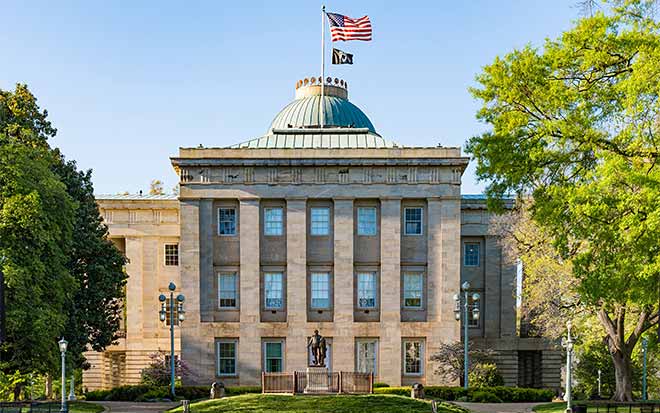March 10, 2025
Old North State Report – March 10, 2025
UPCOMING EVENTS
March 31, 2025
IIANC Thinkers Lunch: What Do Voters Want?
LEGISLATIVE NEWS
SENATE ADDS MORE FUNDING FOR HELENE DISASTER RELIEF
The North Carolina Senate approved a bill for a fourth round of disaster relief for western North Carolina to aid recovery from Hurricane Helene. House Bill 47 allocates $545 million for recovery efforts, including $217 million for the ReBuild NC homebuilding program, which addresses ongoing construction projects from previous hurricanes.
It includes $4.5 million for summer schooling in western North Carolina to help students catch up after missed classes due to the storm. However, the Senate removed $15 million for small-business grants and $10 million for rental assistance.
It also increased agricultural aid to $192 million for crop loss programs and debris removal. Major funding includes $140 million for a new homebuilding program, $100 million for road and bridge repairs, and $55 million for local infrastructure repairs. The bill passed the Senate 45-0 and will now go to the House for concurrence; although there is also a possibility the bill could go to conference if the House is not satisfied with the Senate’s changes to the bill.
STATE EYES INVESTMENT IN CRYPTOCURRENCY
House Bill 92, sponsored by House Speaker Destin Hall (R-Watauga), would permit the state treasurer to invest up to 10% of state funds, such as pensions, in digital assets like cryptocurrencies and NFTs. Recently, many states have introduced similar legislation.
On Tuesday, the House Commerce Committee put the bill on hold due to concerns about its soundness. Proponents argue that investing in cryptocurrencies could lead to significant gains for pension plans as the market is expected to rise. However, critics, including the State Employees Association of North Carolina, caution against risking pension funds meant for retiring state workers.
While the committee did not reject the bill completely, it postponed the vote indefinitely to allow further research into cryptocurrency and to consult with State Treasurer Brad Briner, who has been in office for two months, about the implications of this investment authority.
Hall emphasized that the state’s pension fund cannot diversify effectively without investing in digital assets like Bitcoin. The House Pensions and Retirement Committee is set to discuss the bill further at its meeting on March 12, and if it receives a positive response, it will proceed to the full House chamber.
Read more by Carolina Public Press
LEGISLATION WOULD RAISE TEACHER PAY, RESTORE MASTER’S BONUS
North Carolina Republicans have proposed a new bill to raise the base pay for teachers and reinstate bonuses for master's degrees. House Bill 192, filed by Rep. Erin Paré (R-Wake) and three other Republican representatives, aims to increase teachers' salaries by $9,000 to $12,000 each year based on their experience.
Rep. Donny Lambeth (R-Forsyth) highlighted the bill's goals, stating it shows support for teachers and acknowledges current pay challenges in the state. According to the National Education Association, North Carolina is among the lowest states for average and starting teacher salaries, spending less per student and on teacher pay compared to nearby states like Georgia, Virginia, and South Carolina.
The state previously eliminated additional pay for master's degrees in 2013. Lambeth is hopeful about the bill but expresses concern about funding sources for the pay increases. The bill will move to the Committee on Appropriations for budget evaluation before proceeding to the House Committee on Rules for a vote.
Read more by The Daily Tar Heel
LEGISLATORS UPDATED ON OPPORTUNITY SCHOLARSHIP
The priority application window for the 2025-2026 Opportunity Scholarship and ESA+ program closed March 6. On Thursday, a joint meeting of the House Appropriations Committee on Education and the Senate Appropriations Committee on Education/Higher Education received an update on recent data for both programs.
Opportunity Scholarships are North Carolina’s voucher program for K-12 students, allowing them to attend a chosen eligible private school. The award amounts depend on household income, ranging from $3,458 to $7,686 per year for tuition and fees. Families with the lowest incomes receive first priority.
Both programs are administered by the North Carolina State Education Assistance Authority. Mary Shuping, interim executive director, mentioned at the committee meeting that 2024 was a significant year for the agency. They made over 50,000 retroactive awards to waitlisted students in December and nearly 80,000 spring awards for the spring semester.
For the 2024-2025 school year, about 58% of Opportunity Scholarship recipients were from the first two income tiers, while the highest tier made up 14%. Enrollment in the program more than doubled from 2023-2024 to 2024-2025 after applications were opened to all families. An estimated 5,000 students are currently receiving ESA+ grants. A report will be released in June to show how many students with Opportunity Scholarships attended public school the previous year.
Read more by The Carolina Journal
WHAT WE’RE LISTENING TO
- Under the Dome Podcast
- Do Politics Better Podcast
- WUNC Politics Podcast
- Carolina Newsmakers Podcast
- NC Capitol Wrap Podcast




